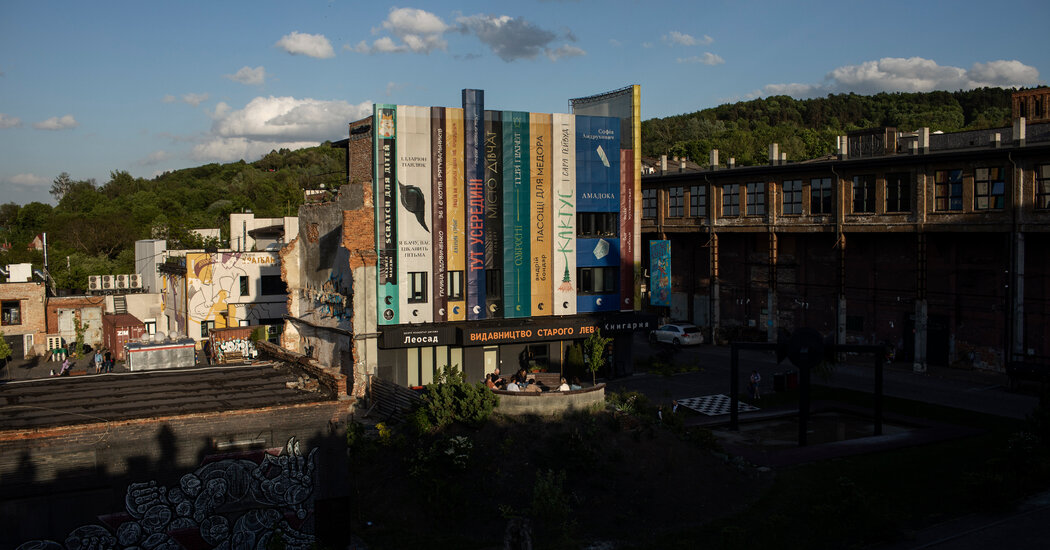
LVIV, Ukraine — The teacher sounded her words slowly, careful to show which syllable to stress: Eyebrow. Cheekbones. Hair.
The students, arranged in a semicircle around her, parroted them back. But they were not there to learn a foreign tongue: Aged 11 to 70, they were Ukrainians, in Ukraine, trying to master the official language of their own country.
Since Russia’s invasion, a number of language clubs have opened in cities in western Ukraine. Teachers and volunteers are reaching out to millions of displaced people who have fled to the relative safety of western cities like Lviv from the Russian-speaking east — encouraging them to practice and embrace Ukrainian as the language of their daily lives.
An estimated one in every three Ukrainians speaks Russian at home, according to researchers, and many of them — outraged by the violence of Russia’s invasion — are enthusiastically making the switch as a show of defiance.
Ukraine’s large population of Russian speakers is a legacy of centuries of dominance by its more powerful neighbor — from the age of the Russian Empire to the rise of the Soviet Union. Though most are familiar with the Ukrainian language, the transition is not without trepidation for some like Anna Kachalova, 44, who grew up speaking Russian. Language clubs offer an inviting space to build confidence.
“I understand Ukrainian — I just can’t speak it,” she said. Despite feeling that the switch was important, the sudden transition to another language has been hard, she added. “It’s a psychological thing.”
She found help at a language club at a Lviv library run by a private volunteer organization, Yamova. Grimacing as she stumbled through her story in Ukrainian, she pushed on anyway.
“From the moment we got here, my children and I agreed: We will only speak Ukrainian,” said Ms. Kachalova, who is half Russian and fled her battered home city of Chernihiv, north of Kyiv, the capital. “I even try to use Ukrainian now in my head — for my inner dialogues.”
Ukrainian language activists see a unique opportunity in the westward displacement.
“When you switch languages, it’s like switching identities,” said Natalya Fedelchko, who founded another language club, Yadinya, which means the United Ones.
“Now, while they are still in a Ukrainian-speaking region, we thought it would be easier to make the transition. With these clubs, we want them to feel everyone accepts them — regardless of the way they speak Ukrainian.”
The trend can be felt from pop music to social media. On TikTok and Instagram, influencers promote Ukrainian words of the day or recommend Ukrainian bands as alternatives to once-popular genres like Russian rap.
Dantes, a singer who once sang only in Russian or English, recently released a song in Ukrainian, “Hug Me,” which encourages Russian speakers to make “the switch.”
But most language activists were promoting Ukrainian long before the Russian invasion in February.
Yamova emerged after Russia’s 2014 annexation of Ukraine’s Crimean Peninsula. That same year, Ms. Fedelchko’s Yadinya was prompted not by war, but by outrage that her son’s school in Kyiv was teaching in Russian.
After the collapse of the Soviet Union, and Ukraine’s declaration of independence in 1991, the country experienced many waves of “Ukrainization,” said Olga Onuch, who researches the relationship between language and politics at the University of Manchester. President Volodymyr Zelensky was an inspiration for one of the recent waves, she said.
A former comedian, Mr. Zelensky grew up speaking Russian, but switched to Ukrainian in 2017 before running for office.
Under his leadership, Kyiv strengthened its Ukrainian language law in 2019, requiring schools and public places to use Ukrainian. Russia pointed to this law before its invasion to argue that Ukrainian Russian speakers were under attack.
Yet Russian remains a common tongue in the country. Some Ukrainians said that in their youth, Russian felt like the language for urbane cosmopolitans — a notion they now reject as part of what many call “decolonization” of their culture.
Ukraine chafes at Russia’s references to it as “Little Brother.” Throughout the centuries of Russian domination, intellectuals and nationalists were executed or imprisoned periodically. They were also subject to population transfers under Stalin, whose government expelled more than half a million Ukrainians to Russia.
It is a sensitive history for some of those enthusiastically switching to Ukrainian now.
At a Yadinya language club, teacher Maria Hvesko argued that Russia had intentionally tried to erase Ukrainian culture in the east when one of her students, Victoria Yermolenko, offered polite opposition.
“This ‘Russification’— I don’t know if it was always intentional,” she said hesitantly.
Another reason, she argued, was rapid Soviet industrialization in the mid-20th century. This brought many Russian engineers and technicians to eastern Ukraine, as well as specialists from other parts of the Soviet Union, and they used Russian as a common language.
Ms. Yermolenko switched to Ukrainian out of political conviction. But she also did it out of consideration for the local residents of Lviv, concerned they would be pained to hear Russian spoken during these days of war.
“I’ve done a lot of — what’s the Ukrainian word for re-evaluating?” she asked, in Russian.
As her teacher offered a word, Ms. Yermolenko finished the thought in Ukrainian: “So, I’m re-evaluating. For me, it’s something quite drastic. It’s like turning my world upside down.”
Mariia Tsymbaliuk, the Yamova language club director in Lviv, said it is “about rebuilding neural pathways” more than learning the language.
Many students are less familiar with Ukrainian pronunciations, she said, or simply reply in Russian to Ukrainian speakers without realizing it. It is common in Ukraine, especially in metropolitan areas like Kyiv, to hear conversations where one person speaks Russian, and the other Ukrainian. Mixing the two is also common in Ukraine.
Though they are both Slavic, the two languages are different. Most Ukrainians say that without having grown up in an environment where both are spoken, they would not be mutually intelligible.
Ms. Tsymbaliuk said she believes that helping people to speak only Ukrainian is her national duty.
Despite the warm linguistic embrace most Ukrainian speakers show their Russian-speaking compatriots, tensions linger. Some said they did not want to voice concerns publicly at a time of war, when they valued unity over language politics.
Lviv’s new Ukrainian-language students and teachers say there is also a class dimension that cannot be ignored. Ms. Hvesko said most attendees of her club were financially well-off.
“Other people struggling are just trying to subsist. They can’t think about language now,” she said.
Ms. Onuch, the professor, said there was little data yet to support the notion that Russia’s invasion had accelerated a switch. And for many Russian-speaking Ukrainians, she said, language was not so tied to identity politics before the invasion.
“Now, they’re thinking about it, and it starts meaning something,” she said. “Taking away that glimmer of Russian greatness, to switch over to Ukrainian, is a power. They are so powerless right now. This is the one power they have.”
Ms. Yermolenko framed her decision as a positive embrace.
“I don’t want to use Russian, not only because it’s the language of the occupier, but also because: Why not use Ukrainian? It’s so cool.”
Like many from the east, she said that, before reaching Lviv, her memories of speaking Ukrainian were isolated to visits with her grandparents at the family’s ancestral village. For most of her life, she associated the Ukrainian language with “peasants and old people.”
Hearing teenagers cracking jokes and using slang in Ukrainian, strolling the cobblestone streets at night, felt like a revelation to her.
“For them, it’s nothing,” she said. “For us, it’s like a miracle.”




